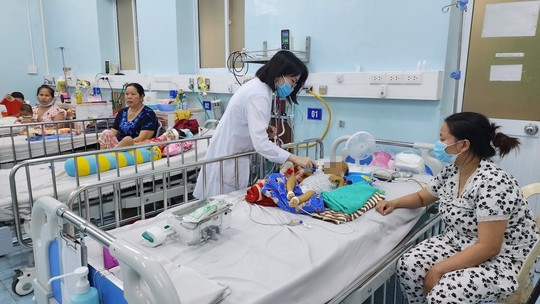The above information was announced by Dr. Dang Xuan Vinh, Head of General Planning Department - Children's Hospital 2, on June 26.

Pediatric patients treated at the Hepatobiliary Pancreatic Department, Children's Hospital 2 (HCMC)
Accordingly, on the same morning, the boy LGB (11 years old, from Binh Dinh) received a liver transplant from his biological mother's donated organs. This is the first liver transplant after the hospital temporarily stopped performing it for many reasons.
According to medical history, baby B. had congenital biliary atresia and underwent biliary-enteric anastomosis (Kasai) at 1 month of age. However, after 10 years of treatment, the baby developed cirrhosis and required a liver transplant to have a chance of survival. Faced with this situation, the baby's mother decided to donate her liver to save her child.
The mother had her liver removed with the support of the University of Medicine and Pharmacy Hospital in Ho Chi Minh City. After that, the medical team from Children's Hospital 2 undertook the liver transplant for the baby.
Doctor Vinh said that after this surgery, on June 30, the hospital is expected to continue liver transplant surgery for another child patient who also has congenital biliary atresia and received a donated liver from his biological mother.
According to Dr. Vinh, the hospital has carefully prepared for liver transplants, from consultation and psychological counseling for organ donors to preparation of facilities, human resources; sterile operating rooms; equipment; consumables; medicine...
Previously, some families with children with end-stage liver failure being treated at Children's Hospital 2 had to go to Hanoi for liver transplants.
Dr. Pham Ngoc Thach, Deputy Director of Children's Hospital 2, said that there are three reasons for the delay in liver transplants for children. First , to have a liver transplant, there must be an immunological compatibility, not just parents with the same bloodline. Second , the child must respond to the treatment method because some cases are over-indicated for liver transplants because the children come to the hospital late. Third , the hospital is receiving transfers so it depends on partner hospitals to get the liver part of the adult.
Every year, Children's Hospital 2 receives about 70-80 children with end-stage liver failure waiting for a transplant. If a liver transplant is performed, the success rate of survival after 1 year is 90%, and after 5 years is over 80%.
Source






































































































Comment (0)